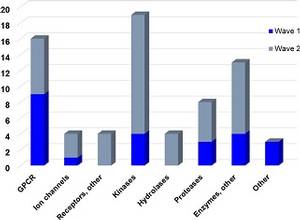News Archive
Donated chemical probes for open science
April 2018. Potent, selective and broadly characterized small molecule modulators of protein function, called `chemical probes´, are powerful research reagents. Several pharmaceutical companies associated with the SGC have entered into a pre-competitive collaboration to make available a large number of innovative high-quality probes, including all probe-associated data, control compounds and recommendations on use.
The function of a protein can be explored in several different ways. Genetic approaches are used to suppress the expression of the respective gene/protein, for example using gene editing methods such as siRNA, shRNA or CRISPR/Cas9. However, in medical drug discovery, these methods have some deficiencies. They commonly remove or suppress the entire protein and thus cannot easily reveal the function of a specific druggable protein domain – although domain-based CRISPR is becoming a more widely used method. Also, they are not reversible, their effects are not instantaneous and they not only disrupt the protein, but also the protein interactome around the targeted protein. In contrast, chemical probes can probe the particular function of a targeted domain and can therefore be used to study its role in biological processes and in human disease in a dose and time-dependent manner. These small molecules can be used in a broad panel of assay systems comprising primary cells, tissues and also in vivo models, and other systems not easily amenable to genetic target validation methods.
 The pharmaceutical companies AbbVie, Bayer, Boehringer Ingelheim, Janssen, MSD, Pfizer and Takeda have entered into a pre-competitive collaboration to make available a range high-quality probes, including all probe-associated data, control compounds and recommendations on use (link). A recently published article in the journal eLife describes the chemical tools and target-related knowledge that have been made available, and encourage others to join the project. The authors emphasize that the open access/open science approach is the fastest route to reach the end users and thereby to have a positive effect on research. More ...
The pharmaceutical companies AbbVie, Bayer, Boehringer Ingelheim, Janssen, MSD, Pfizer and Takeda have entered into a pre-competitive collaboration to make available a range high-quality probes, including all probe-associated data, control compounds and recommendations on use (link). A recently published article in the journal eLife describes the chemical tools and target-related knowledge that have been made available, and encourage others to join the project. The authors emphasize that the open access/open science approach is the fastest route to reach the end users and thereby to have a positive effect on research. More ...
Figure: Overview of targets for which pharmaceutical companies have volunteered to donate chemical probes (Müller et al. eLife 2018;7:e34311 doi: 10.7554/eLife.34311)
Contacts:
Stefan Knapp, Institute of Pharmaceutical Chemistry, knapp@pharmchem.uni-frankfurt.de; Volker Dötsch, Institute of Biophysical Chemistry, vdoetsch@em.uni-frankfurt.de; Susanne Müller-Knapp, SGC Frankfurt, susanne.mueller-knapp@bmls.de; Buchmann Institute for Molecular Life Sciences, Riedberg Campus, Goethe University Frankfurt, Frankfurt am Main, Germany
Publication:
Müller S, Ackloo S, Arrowsmith CH, Bauser M, Baryza JL, Blagg J, Böttcher J, Bountra C, Brown PJ, Bunnage ME, Carter AJ, Damerell D, Dötsch V, Drewry DH, Edwards AM, Edwards J, Elkins JM, Fischer C, Frye SV, Gollner A, Grimshaw CE, Ijzerman A, Hanke T, Hartung IV, Hitchcock S, Howe T, Hughes TV, Laufer S, Li VMJ, Liras S, Marsden BD, Matsui H, Mathias J, O'Hagan RC, Owen DR, Pande V, Rauh D, Rosenberg SH, Roth BL, Schneider NS, Scholten C, Singh Saikatendu K, Simeonov A, Takizawa M, Tse C, Thompson PR, Treiber DK, Viana AYI, Wells CI, Willson TM, Zuercher WJ, Knapp S, Mueller-Fahrnow A (2018) Donated chemical probes for open science. eLife 7: e34311, published online 20 April 2018. http://dx.doi.org/10.7554/eLife.34311
Cluster of Excellence Macromolecular Complexes, Frankfurt am Main, Germany

